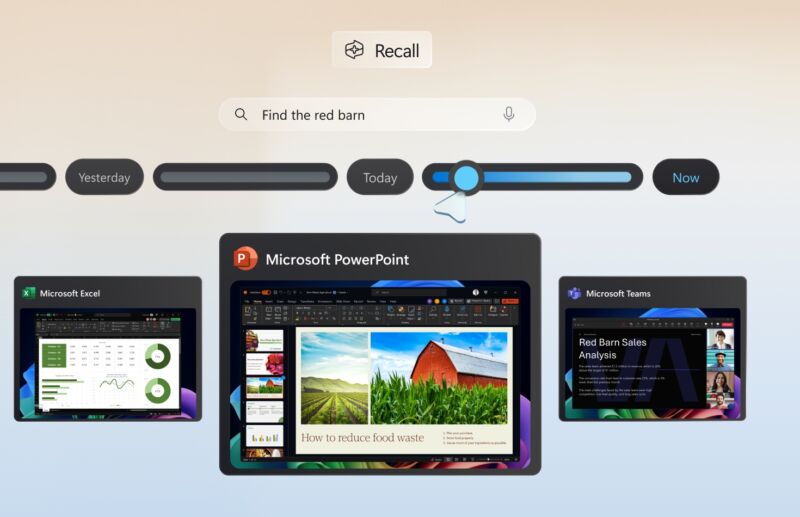recall reincarnated —
Initial Recall preview was lambasted for obvious privacy and security failures.

Enlarge / The Recall feature provides a timeline of screenshots and a searchable database of text, thoroughly tracking everything about a person's PC usage.
Microsoft
Microsoft will begin sending a revised version of its controversial Recall feature to Windows Insider PCs beginning in October, according to an update published today to the company's original blog post about the Recall controversy. The company didn't elaborate further on specific changes it's making to Recall beyond what it already announced in June.
For those unfamiliar, Recall is a Windows service that runs in the background on compatible PCs, continuously taking screenshots of user activity, scanning those screenshots with optical character recognition (OCR), and saving the OCR text and the screenshots to a giant searchable database on your PC. The goal, according to Microsoft, is to help users retrace their steps and dig up information about things they had used their PCs to find or do in the past.
The problem was that other users on the same PC, or attackers with physical or remote access to your PC, could easily access, view, and export those screenshots and the OCR database since none of the information was encrypted at rest or protected in any substantive way.
Microsoft had planned to launch Recall as one of the flagship features of its Copilot+ PC launch in July, along with the new Qualcomm Snapdragon-powered Surface devices, but its rollout was bumped back and then paused entirely so that Recall could be reworked and then sent out to Windows Insiders for testing like most other Windows features are.
Among the changes Microsoft has said it will make: The database will be encrypted at rest and will require authentication (and periodic reauthentication) with Windows Hello before users will be allowed to access it. The feature will also be off by default, whereas the original plan was to turn it on by default and make users go into Settings to turn it off.
"Security continues to be our top priority and when Recall is available for Windows Insiders in October we will publish a blog with more details," reads today's update to Microsoft Windows and Devices Corporate Vice President Pavan Davuluri's blog post.
When the preview is released, Windows Insiders who want to test the Recall preview will need to do it on a PC that meets Microsoft's Copilot+ system requirements. Those include a processor with a neural processing unit (NPU) capable of at least 40 trillion operations per second (TOPS), 16GB of RAM, and 256GB of storage. The x86 builds of Windows for Intel and AMD processors don't currently support any Copilot+ features regardless of whether the PC meets those requirements, but that should change later this year.
That said, security researchers and reporters who found the holes in the original version of Recall could only find them because it was possible to enable them on unsupported PCs, just as it's possible to run Windows 11 on PCs that don't meet the system requirements. It's possible that users will figure out how to get Recall and other Copilot+ features running on unsupported PCs at some point, too.